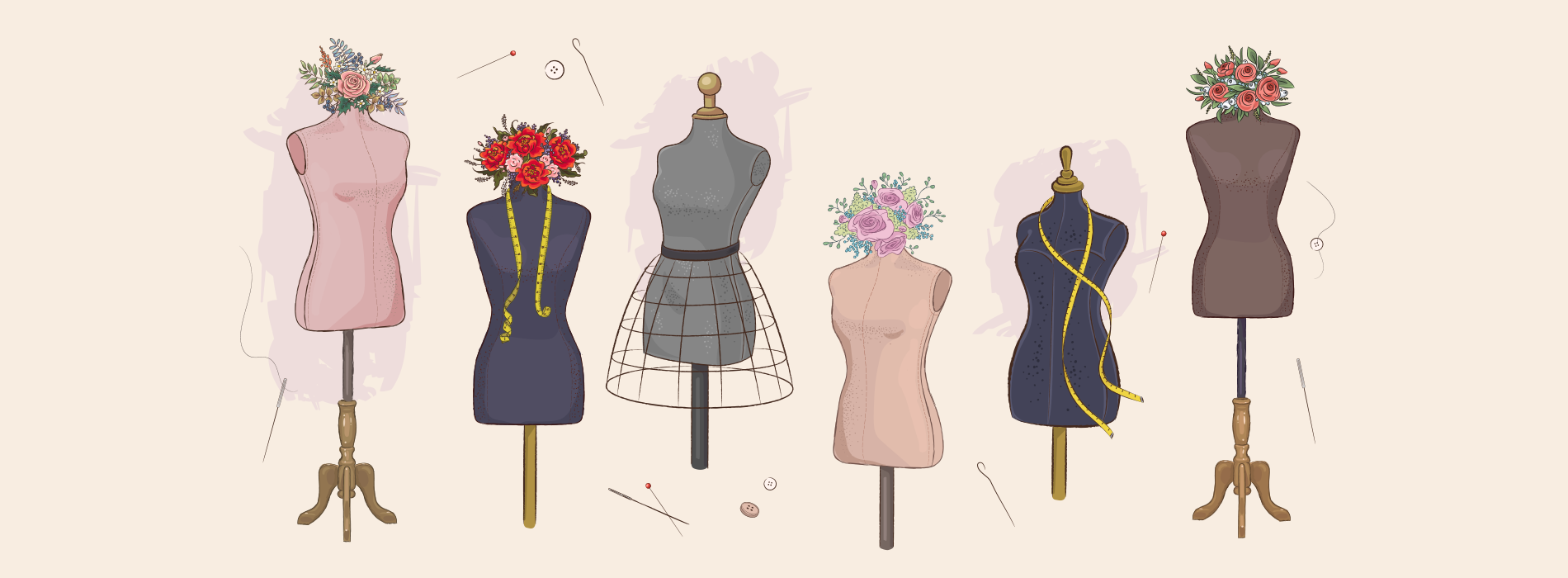Course Details & Eligibility
In the last 20 years, the industry of fashion design has grown rapidly. A rich profession might be understood and designed with the help of the fashion design course, which was developed to offer a route for creative exploration, skills, and specialised knowledge. Students may learn about creating patterns, graphic design, creating clothing, fashion illustration, and much more after taking a fashion design course after 12th standard, there are three options for the fashion design course: a certificate, a diploma, and an undergraduate degree. We have provided a few well-known choices that have successfully helped students achieve their career objectives.- Certificate in pattern design
- BSc fashion design
- Bachelor of design
- Diploma in fashion design
Fashion Designing Course After 12th
The development of original garment designs is a crucial component in fashion design. The raw material management process, which is an element of the chain process involved in fashion designing, involves size measurement, equipment, and garment warehouses. A fashion design student aims is to be able to walk down the ramp with their collection and gain recognition for their hard work on a national and worldwide level. If a student is imaginative and creative and has an understanding of the most recent market trends, they may simply choose to enrol in fashion designing classes once they complete their 12th-grade education to pursue a career in fashion designing. These courses entail designing, creating, and building outfits. With the greatest pay packages in the world, it is simple to become a fashion stylist, designer, retail manager, consultant, etc. After completing the 12th grade, students can choose to take courses in fashion design to learn about basic to advanced fashion principles. Fashion design is a fundamental kind of artistic expression that involves creating clothing and other items for daily use. A new estimate indicates that India’s fashion industry is growing at an astounding 70% each year.Admissions for Fashion Design Program After the 12th Grade
A course called “Fashion Designing” was developed especially for artists. Fashion design is one of the most alluring and well-liked career options for students finishing their 12th grade because of the excellent salary and fame. Students may apply after completing the 12th grade for this course. Despite the fact that without a 12th-grade certification, there are online diploma courses available, such as the Diploma in Fashion Design offered by AAFT Online. A diploma in fashion design after the 12th is the best choice for anyone looking to launch a career in the fashion sector. Courses in fashion design aid in developing abilities and offer a training program that focuses primarily on the calibre of the intended output. Fashion may be found in the areas of apparel, footwear, accessories, cosmetics, way of life, hair, and body. Students must pass the relevant admission test in order to enrol in this program at any prestigious college. Exams like the AIFD WAT, SOFT, NID DAT, UCEED, CEED, AIEED, IIAD, and NIFT are options after 12th grade to pursue a fashion design course.Eligibility for Fashion Design Course After 12th Grade
Once a student has completed their 12th grade, they can enrol in a fashion design course at the graduate and postgraduate levels. In essence, candidates are eligible to apply if they have successfully completed the 10+2 learning level at a reputable, well-known institution. It is absolutely mandatory for students to pass the intermediate test with a score of 45% or above. To be eligible for admission, students must additionally take either the national or university-level entrance examinations. The results of admission tests like UCEED, CEED, and others will determine which students are admitted. UCEED: After earning a strong UCEED Entrance Exam score, several Indian IIT Institutes offer Bachelor of Designing programs. Undergraduate Common Entrance Examination for Design is the official name of the test. This national entrance exam is open to students from all streams.Entrance Exams for Fashion Designing After 12th Grade
Top entrance exams for fashion design in India include NIFT, SEED, AIEED, UEED, and others. These national entrance tests are held to offer admission to BDes, BSc in Design, and other fashion diploma programs. Simple multiple-choice questions make up the entrance exam for fashion design courses offered after the 10th and 12th grades. It is up to the institutions to accept these entrance exam results.How to Choose the Best Fashion Designing Courses After the 12th?
There are many institutions that have enrolled students in these courses, but the primary variations are in the structure of the program and the requirements of the course itself. This makes it difficult for students to choose the finest fashion designing course once they complete their 12th grade. When selecting a fashion design program for oneself, several variables need to be taken into account. Here are 8 crucial suggestions that applicants should take into consideration while selecting the best fashion design program.1. Area of Interest:
Professionals with specialities are in great demand in India’s fastest-growing fashion design sector. Therefore, you must be an expert in a specific genre. For instance, if you love accessories, you should enrol in a fashion design diploma or certificate program with Fashion Accessory as a concentration.2. Course Duration and Benefits:
Suitable course duration is a key consideration when selecting a fashion design program. There is a large range of short-term and long-term courses available at the majority of fashion design colleges. For people who wish to enhance their careers in fashion design, a short-term fashion designing course is a good option because it is mostly industry-focused. On the other hand, long-term courses guarantee to give students basic to advanced knowledge as well as industry-required competence. Students should thus consider the advantages and duration of a course before enrolling.3. Course Accreditation:
Any degree or diploma program’s worth is determined by its level of accreditation. The accreditation of a design school or university by the relevant authorities guarantees that it has undergone strict expert examination. A diploma from an approved institution is valued worldwide. Checking the accreditation status of the fashion design college to where you want to get admitted is crucial.4. Teaching Techniques:
The teaching methodology used by the college should also be considered before choosing one. Your path to a successful career in the fashion design sector will be paved with appropriate and modern pedagogy and teaching techniques. You should attend a trial class in any institution before enrolling to get a sense of the teaching style and lab equipment available.5. Placement Scenario:
A college’s placement program is a significant factor in determining its overall excellence. After finishing their fashion design courses, all students search for the greatest placement prospects, and they base their decision on a college’s placement rates. You need to do some study on the college’s placement records to which you want admission. Find out whether they have a placement cell to help students get ready for the recruiting rounds as well.6. New Education Policy:
Check to see if the academic environment is NEP-friendly at the fashion design school of your choice. The New Education Policy (NEP) has developed strategies to support the addition of more skills-based design courses. Additionally, it gives candidates the freedom to select a degree or diploma program in between their current academic terms, depending on their needs. The NEP prioritises practical and research-based training over a sole concentration on academic courses. Developing your abilities and receiving high-quality education will increase your employability in your early years of life in accordance with worldwide norms.7. Internship and Job Training:
A variety of advantages come with an internship, including helping you provide a practical component to your academic work. Candidates improve their professional ability, strengthen their moral character, and gain knowledge of the demands of the position through internships. An internship gives students practical experience and exposure while also expanding their professional options. In the world of fashion, practical experience is essential for success. You will provide yourself with the widest range of chances with an internship when you look for and apply for a job after college. If your design college helps you find the greatest internships, taking advantage of this international change will enable you to refine your talents and get respectable employment.8. Course Fees:
Another important consideration for candidates to consider before selecting a college is the cost of the fashion design courses. Depending on the institution, the type of course, and the location, the course fees may change. Candidates should select a course that won’t strain their wallets.Best Fashion Designing Courses After 12th
List of Fashion Designing Courses that can be pursued after finishing intermediate education. It offers bachelor, diploma, and certification programs. To become professional fashion designers, students can choose from a variety of fashion design courses.Undergraduate Course in Fashion Designing
- Bachelor of Fashion Designing (BFDes)
- BSc in Fashion Designing
- BA Hons in Fashion Designing
- BTech in Apparel Production
- Bachelor of Textile Designing
- B.Des in Interior Designing
- Bachelor of Fashion & Apparel Design
- BBA in Fashion Designing
Diploma in Fashion Design
- Diploma in Fashion Design
- Diploma in Apparel Designing
- Diploma in Textile Designing
Certificate Course in Fashion Designing
- Fashion Styling Course
- Fashion Design Course
- Footwear CAD Design Online Course
- Professional Certificate in Fashion Design and Creation
- Sustainable Fashion
- Sketching For Fashion Design
- Footwear CAD Design Online Course
- Fashion CAD Design Online Course
Why Choose Fashion Design as a Career?
With the help of your ideas, you may make the world appear more lovely and appealing by taking fashion design courses. Students who are creative and want to showcase their talents in front of an audience should apply for admission to fashion designing programs once they finish the 12th grade. Do we believe the fundamental idea of fashion design is understood? This will make it easier for students to decide whether or not they are interested in this course of study. Additionally, students should read the other noteworthy points in the list below. After completing the 12th standard, there are several reasons to enrol in fashion design classes, including:- Since there is always a need for fashion, fashion designing is a career option that will always be viable. This training offers a sense of stability.
- Due to the rising need for professionals in this industry, employment prospects are also increasing.
- An entry-level employee’s initial salary might range from INR 2,34,000 to INR 5,45,000 on average. This can increase with experience and knowledge.
- Students with exceptional skills have a better chance of succeeding in the fashion designing program since it places more emphasis on practical skills than academic knowledge.
Skills Required in Fashion Designing
Skill requirements for pursuing a fashion designing course are listed below:- Artistry and Creativity: One of the most essential qualities a fashion designer should possess is artistic talent and vivid images for original ideas. Every fashion designer should work hard on their sketching talents since being a sketch artist is the first step to portraying the draught design into a piece of art. To express your art via unique designs, you need to be creative and artistic.
- Business Acuity: True success as a fashion designer requires the ability to keep up with the financial targets of your company. While creativity is a key component of success, sound business acumen is also necessary to obtain the appropriate materials and stay within the allocated budget.
- Communication Skills: Communication abilities are necessary for a successful partnership if you want to advance your profession as a fashion designer. Sharing your thoughts, gathering feedback, and receiving criticism all go hand in hand with effective communication techniques. Building strong and effective communication skills is crucial for a successful job.
- Enthusiasm in Trends: Both trends and consumer needs are always evolving. It’s crucial for you to keep a close watch on how the market you want to target is developing and expanding as a student interested in fashion design. It is also crucial to learn from and watch how those dependable artists whom you could view as rivals translate their design and creativity into shifting trends and create a certain set of skills.
- Team Skills and Collaborative: As a fashion student, having good team dynamics is crucial. Fashion designers are responsible for much more than simply creating clothing; they also conduct research, manage marketing campaigns, and much more. This calls for a team of individuals that can manage problem-solving, deal with challenges, and work together. You must understand how to engage with each member of your team and function as a team.
- Impressive Needlework: Sewing becomes an essential and among the most basic skills for a fashion designer. You should be able to create the garments you design as a designer. When you, a beginner, take the initiative to get a feeling of experience and understanding of the processes involved in bringing your ideas to reality, everything comes together wonderfully.
- Fashion CAD: In today’s fashion sector, both technical and artistic viewpoints are highly valued. The creative and knowledge-intensive CAD (computer-aided-design) program provides a broad variety of materials, forms, styles, colours, and details that may help you make better and quicker designs and patterns in a digital environment.
Career After Fashion Designing Course
After completing 12th grade, students have a wide range of career options, including being a fashion blogger, fashion writer, fashion editor, fashion designer, etc. Students’ salaries might range from INR 2,34,000 to INR 5,45,000 per year. This course is well-known and in high demand for professional development since it covers a wide range of topics that the industry pays close attention to. After finishing this course, students have the option of working in the industry, which might expose them to how to develop original concepts that subsequently become popular. Career Prospects after completing a fashion designing course:- Fashion Designer
- Retail Manager
- Fashion Coordinators
- Fashion Stylist
- Fashion Consultant
- Textile Designer
- Makeup Artist
- Fashion Illustrator
- Fashion Journalist
- Fashion Stylists
- Fashion Merchandisers
- Creative Pattern Makers
- Trend Analyst
- Forecast Analyst
Overview of the Fashion Design Course
In terms of the arts, fashion design is one of the most popular academic specialities since it combines a financially lucrative job with a gratifying creative life. It focuses on developing clothing and other accessories. Fashion designers have a crucial role in the creation of the apparatus, as well as in the choice of the appropriate material for it, for anything from bracelets and necklaces to business suits and party attire. Generally speaking, societal views and culture have an impact on their job. The two fundamental elements of contemporary fashion design are haute couture and ready-to-wear. Courses in fashion design cover a broad range of patterns, trends, aesthetics, styles, and colours. Students are taught everything from developing designs for apparel, footwear, accessories, and other items to researching historical and contemporary fashion trends. Although it’s crucial to comprehend the fundamentals of the design process, fashion design is about looking into the future to create for today. You will study artisanal design and workmanship, 3D and digital printing, and technical advancements in fashion design in this course. You’ll investigate how design aesthetics, materials, silhouettes, and fit may help you establish your brand. You’ll learn the value of working together with other designers and how the design process is influenced by fresh ways of thinking. Finally, you’ll look at the future of fashion forecasting and how developing your business strategy depends on keeping an eye on trends, social movements, politics, the environment, and pop culture.Conclusion
Students can choose among certificates, degrees, and diplomas in each of the three categories of programs. A student’s professional job will be more effective in nature if they have an interest and pastime in fashion. Drawing and craft creativity ought to be strong to provide individuals with rewarding job alternatives. The clothing industry is in need of new technology, and there are several cutting-edge fashions designing tools and machinery that are facilitating students’ creation of clothing.(Visited 1,272 times, 3 visits today)










